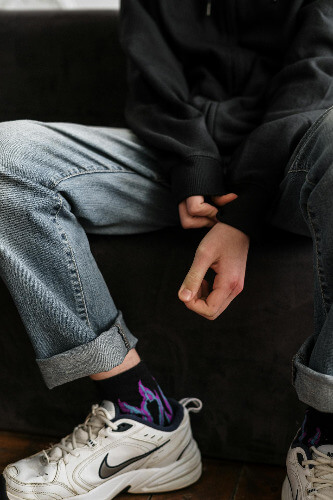Teen Risk and Health: Recognizing Warning Signs and Offering Support
Parenting a teenager often feels like stepping into unknown territory. As parents, your heart races with questions like: Could my teen be experimenting with drugs? Are they self-harming? Is this normal, or a sign of something serious?

Many parents quietly carry the same fears. There are signs you can watch for and gentle steps you can take to support your teens when their health—emotional or physical—may be at risk.
Why Teens Take Risks
Risk-taking is a natural part of adolescence. Teens’ brains are still developing, especially the areas responsible for impulse control and judgment. This is when they are questioning their identity and acceptance from peers.
With so many negative thoughts going through their head this can lead to experimenting with drugs, alcohol, or dangerous behaviors. For some teens it can even lead to self-harm as a way of coping.
Warning Signs to Watch For
Not every mood swing signals trouble. But certain patterns are worth paying attention to.
Possible Signs of Drug or Alcohol Use
- Sudden changes in friends or social groups
- Declining grades or loss of interest in school
- Smell of smoke, alcohol, or strange odors on clothing
- Secretive behavior or lying about whereabouts
- Changes in sleep or appetite
Possible Signs of Self-Harm or Emotional Distress
- Unexplained cuts, burns, or bruises (often hidden under clothing)
- Wearing long sleeves in warm weather
- Withdrawal from family or friends
- Expressions of hopelessness or worthlessness
- Giving away belongings or talking about “not being here”
While none of these signs alone prove drug use or self-harm, they’re red flags worth addressing with care.

How to Approach Difficult Conversations
This is the part most parents dread—bringing up our concerns without pushing our teen away. The key is approaching with empathy, not accusation.
- Choose the right moment. Talk when things are calm, not in the heat of conflict.
- Use “I” statements. Instead of “You’re lying to me,” try, “I’ve noticed some changes and I’m worried about you.”
- Listen more than you speak. Give them space to share, even if it’s uncomfortable.
- Stay calm. If your teen admits something scary, take a deep breath before reacting. Your response sets the tone for whether they’ll trust you again.
When to Seek Help
Sometimes love at home isn’t enough—and that’s okay. Seeking outside support shows strength, not failure.
- School counselors can help identify struggles and provide resources.
- Doctors or pediatricians can screen for substance use or mental health concerns.
- Therapists give teens a safe space to process feelings and learn coping strategies.
- Crisis hotlines (such as 988 in the U.S.) are available 24/7 if you fear your teen is in immediate danger.
Reaching out for help doesn’t mean you’ve failed as a parent. It means you’re doing everything you can to keep your child safe.
Building Trust Before a Crisis
One of the best ways to prevent risks from spiraling is building trust before problems arise. Teens who feel they can talk openly are more likely to turn to parents when they’re in trouble.
Ways to build trust:
- Ask about their world. Not just “How was school?” but “What was the funniest thing that happened today?”
- Share your own experiences. Talk about times you felt pressured as a teen.
- Be available. Sometimes the best conversations happen in the car, at bedtime, or during chores.
- Avoid overreacting. If they tell you something shocking, thank them for trusting you. You can deal with the details later.
Risky behavior and emotional struggles are some of the scariest parts of parenting a teenager. Pay attention to warning signs, open conversations with empathy, and don’t be afraid to seek help when needed.
Frequently Asked Questions About Teen Risk and Health
1. How can I tell if my teen is using drugs or just being secretive?

Look for patterns: changes in friends, grades, sleep, or mood. One sign alone isn’t proof, but several together may suggest something deeper.
2. What should I do if I suspect my teen is self-harming?
Approach gently, with love. Ask open questions and offer support. Avoid judgment or anger. Seek professional help as soon as possible.
3. Should I search my teen’s room if I’m worried?
It depends on the situation. Start with open communication. If safety is at immediate risk, searching may be necessary—but explain your reasons to maintain trust.
4. How do I bring up the topic of drugs without sounding accusing?
Use curiosity, not confrontation. Try: “I’ve heard about teens using [substance]. Have you ever seen that at school?” This opens dialogue without blame.
5. When should I seek professional help?
If your teen shows persistent signs of depression, talks about not wanting to live, or you suspect ongoing substance use, seek help immediately. Trust your gut—early action can save lives.


















New! Comments
Have your say about what you just read! Leave me a comment in the box below.